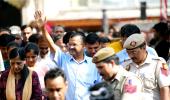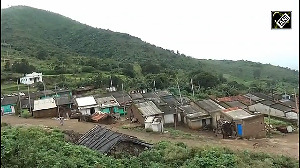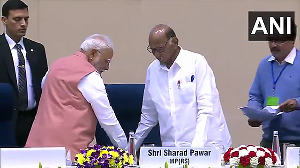The lack of clarity on who is next in line, when the time comes, as indeed it will one day some day, reflects poorly on the management of the world's largest political party.
It scarcely need be said that a squabble between the contenders, Shah and Yogi, is exactly what the doctor ordered for the Opposition, notes Krishna Prasad.

So, Narendra D Modi's guarantee that the Congress would get fewer seats than Rahul Gandhi's age (53) has fallen flat. As has Amit A Shah's bombast that the NDA would cross 400 by 1 pm on June 4.
Even if it gets the right of first refusal to form the next government, the writing is on the wall for the BJP: If this is what it takes to retain power with Narendra Modi hale and hearty, and very much in the picture, how much more difficult will it be when he is not?
In the surround sound of '400 paar' produced, directed and amplified by chamchas, cheerleaders and charlatans, it is easy to forget what it took for the promoters of The West India Company to seek to fetch handsome returns for their shareholders, stakeholders and sleeping partners in FY2024:
- The weaponisation of EC and ED, and the tax terrorism of IT and GST
- The wholesale capture of mainstream media to peddle hatred and propaganda
- The disqualification of Adani-baiters like Rahul Gandhi and Mahua Moitra
- The arrests of two sitting chief ministers in Delhi and Jharkhand
- The en masse suspension of 140 members of Parliament
- The freezing of bank accounts of the Congress and CPI-M
- The monetisation of political power through illegal electoral bonds
- The squeezing of funds to non-BJP ruled states like Karnataka and Kerala
- The purchase of MLAs to break up parties like the Shiv Sena and NCP
- The reduction of the Governor's office to a BJP HQ in West Bengal and Tamil Nadu
- The criminalisation of dissent, and the deployment of Pegasus against citizens
- The hounding of NGOs and thinktanks not in alignment with the theology
Less obviously, over the past year we have seen everything from a G20 summit to the ICC cricket World Cup being turned into tableaux in the ruling party's chunav parv, not to mention the premature opening of the Ram temple in Ayodhya -- or bags of rice and atta with the pradhan pujari's picture.
And, since nothing succeeds like excess, the Election Commission was nudged into staggering the poll over 7 weeks so that the PM's 70-plus 'interviews' could appear in a synchronised symphony. That is, when he was not 'meditating' before Swami Vivekananda's statue while Bengal voted. Or, holding road shows at public cost.
Why? Even a mayoral election in Chandigarh in February wasn't spared of a 'masterstroke' to set the tone for Modi 3.0. Add to all this, Muslim and mughal, mutton and machli, mangal sutra and mujra -- and the shameless Islamophobia pouring out like a polluted Ganga in spate.
So, if all these moves to reinforce the base, rein in rivals, and hegemonise mind space failed to fetch the desired 400 -- and despite the presence of a nationally recognised mascot and vote magnet -- what is in store for the Indian Peoples's Party when Narendra Modi is not in the fray?
The Karnataka assembly elections in 2023 provided the 'trailer'.
In seven pre-election visits to the southern state, accompanied by the same ambient noises as now, Modi addressed public meetings in 16 constituencies -- the BJP lost in 14 of them. Yogi Adityanath, who is projected as the next in line on odd days, was paraded through 10 constituencies -- the BJP lost in all 10.
Minus Modi?

***
The emerging picture of the BJP after Modi is so clear that the French political scientist Christophe Jaffrelot told The New Yorker last year that Modi's popularity has not completely turned into support for the BJP, which could have serious implications for the party after he is gone.
Worse, given the high stakes and the big shoes, his successor might not even bother with elections. 'If you cannot be as charismatic or as popular as the man who has created this ecosystem, you may not tend to risk elections,' Jaffrelot later told Karan Thapar of The Wire.
Which is perhaps why everybody from the Hyderabad economist Parakala Prabhakar to the New York journalist Edward Luce was warning that this may well be India's last, proper democratic election.
Sounded alarming at the time, yes, perhaps even over the top. But when was the last time Germany, the United States, and the United Nations expressed concerns over the state of India's democracy, which now attracts adjectives all the way from flawed and illiberal, to autocratic and elections-only?
By putting all its dhoklas in one basket, without grooming a No. 2, the Sangh Parivar appears to have made the most basic management mistake: To let an individual become bigger than the institution from which he emerged.
In the first election ads, Modi's name was bigger than BJP's; his face bigger than the lotus symbol. But by hurriedly making the one-nation-one-election report a part of the BJP manifesto, Nagpur may well have sent the clearest signal yet of how it is preparing the stage for the post-Modi age.

It used to be said of Dr Manmohan Singh, in a pejorative sort of way, that he was an under-rated politician and an over-rated economist. Ditto Arvind Kejriwal, an ex-IRS officer. Half-way through the election, the Delhi chief minister coolly fired a teargas shell into the BJP tent, stating that Modi would make way for Amit Shah when he turns 75 in 2025, and that he was only seeking votes for Shah in this election.
Suddenly, the hazy doubt over 'What after Modi?' was transformed into 'Who after Modi?' in the eyes of the party's workers and supporters. The potency of the poser -- its damage potential -- will remain long after June 4, especially given BJP's poor showing in Uttar Pradesh.
Inherent in the BJP's Methuselah defence -- 'Modiji will complete his full term' -- is a staggering unpreparedness for life after Modi. Its over-the-top reaction to a Congressman's intimation of Modi's mortality is further proof that the party is no position to contend with life's greatest certainty.
But the lack of clarity on who is next in line, when the time comes, as indeed it will one day some day, reflects poorly on the management of the world's largest political party. It scarcely need be said that a squabble between the contenders, Shah and Yogi, is exactly what the doctor ordered for the Opposition.
(By an accident of biology, Rahul Gandhi will always be 20 years younger than Modi.)

***
The great irony of Indian democracy -- the paradox of its political marketplace -- is that it is no longer the parties or their candidates which are on test; it is actually the voter and her wisdom.
So, broadly speaking, while the urban, literate, prosperous, upper caste Vande Bharat voyagers seem ever more susceptible to the pap they are exposed to, it is the rural, illiterate, poor, underprivileged, lower caste Covid walkers that were able to see through the competing 'guarantees'.
This election, in that sense, was as much a class war between two contending ideas of India as a contest between competing brands and products.
'India always surprises you in the intelligence of its electorate,' the former RBI governor Raghuram Rajan bloviated recently. 'Right from the first elections in the early 1950s, when we thought how can a largely illiterate population deliver good results, I think again and again we have been surprised by the maturity of the voters. I am hopeful we will see good results from their thinking.'
The qualities Rajan listed for a democratic verdict -- intelligence, maturity, thinking -- seem to have wholly deserted one India and lodged themselves in the other. No prizes for guessing which psephologist would agree with that more after June 4: Prashant Kishor or Yogendra Yadav.
Krishna Prasad is former editor-in-chief, Outlook, and former member, Press Council of India.
Feature Presentation: Aslam Hunani/Rediff.com











 © 2025
© 2025